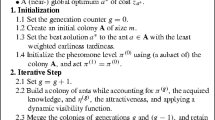Abstract
Ant Colony Optimization (ACO) is a metaheuristic that has recently been applied to scheduling problems. We propose an ACO algorithm for the Single Machine Total Weighted Tardiness Problem and compare it to an existing ACO algorithm for the unweighted problem. The proposed algorithm has some novel properties that are of general interest for ACO optimization. A main novelty is that the ants are guided on their way through the decision space by global pheromone information instead of using only local pheromone information. It is also shown that the ACO optimization behaviour can be improved when priority scheduling heuristics are adapted so that they appropriately reflect absolute quality differences between the alternatives before they are used by the ants. Further improvements can be obtained by identifying situations where the ants can perform optimal decisions.
Similar content being viewed by others
References
M. Dorigo and G. Di Caro, “The ant colony optimization metaheuristic,” in New Ideas in Optimization, edited by D. Corne, M. Dorigo, and F. Glover, McGraw-Hill, pp. 11–32, 1999.
P. Forsyth and A. Wren, “An ant system for bus driver scheduling,” University of Leeds—School of Computer Studies, Report 97.25, 1997.
A. Colorni, M. Dorigo, V. Maniezzo, and M. Trubian, “Ant system for job-shop scheduling,” JORBEL—Belgian Journal of Operations Research, Statistics and Computer Science, vol. 34, pp. 39–53, 1994.
M. Dorigo, V. Maniezzo, and A. Colorni, “The ant system: Optimization by a colony of cooperating agents,” IEEE Trans. Systems Man, and Cybernetics—Part B, vol. 26, pp. 29–41, 1996.
T. Stützle, “An ant approach for the flow shop problem,” in Proc. of the 6th European Congress on Intelligent Techniques & Soft Computing (EUFIT'98), vol. 3, Verlag Mainz, Aachen, 1998, pp. 1560–1564.
A. Bauer, B. Bullnheimer, R.F. Hartl, and C. Strauss, “An ant colony optimization approach for the single machine total tardiness problem,” in Proceedings of the 1999 Congress on Evolutionary Computation (CEC99), Washington D.C., USA, 6–9 July, 1999, pp. 1445–1450.
R. Michels and M. Middendorf, “An ant system for the shortest common super-sequence problem,” in New Ideas in Optimization, edited by D. Corne, M. Dorigo, and F. Glover, McGraw-Hill, pp. 692–701, 1999.
D.J. Du and J.Y.-T. Leung, “Minimizing the total tardiness on one machine is NP-hard,” Mathematics of Operations Research, vol. 15, pp. 483–496, 1990.
E.L. Lawler, “A ‘pseudopolynomial’ algorithm for sequencing jobs to minimize total tardiness,” Annals of Discrete Mathematics, pp. i:331–342, 1977.
H.A.J. Crauwels, C.N. Potts, and L.N. VanWassenhove, “Local search heuristics for the single machine total weighted tardiness scheduling problem,” INFORMS Journal on Computing, vol. 10, pp. 341–359, 1998.
R.K. Congram, C.N. Potts, and S.L. van de Velde, “An iterated dynasearch algorithm for the single-machine total weighted tardiness scheduling problem,” INFORMS Journal on Computing, vol. 14, pp. 52–57, 2002.
M. Dorigo and L.M. Gambardella, “Ant colony system: A cooperative learning approach to the travelling salesman problem,” IEEE Trans. on Evolutionary Comp., vol. 1, pp. 53–66, 1997.
http://mscmga.ms.ic.ac.uk/jeb/orlib/wtinfo.html.
M. den Besten, T. Stützle, and M. Dorigo, “Ant colony optimization for the total weighted tardiness problem,” in Parallel Problem Solving from Nature: 6th International Conference, edited by M. Schoenauer et al., Springer-Verlag, LNCS 1917, pp. 611–620, 2000.
Author information
Authors and Affiliations
Rights and permissions
About this article
Cite this article
Merkle, D., Middendorf, M. Ant Colony Optimization with Global Pheromone Evaluation for Scheduling a Single Machine. Applied Intelligence 18, 105–111 (2003). https://doi.org/10.1023/A:1020999407672
Issue Date:
DOI: https://doi.org/10.1023/A:1020999407672




